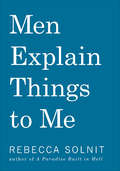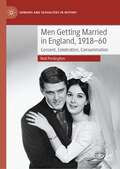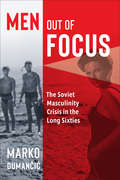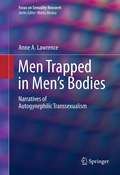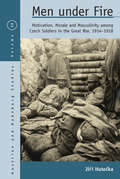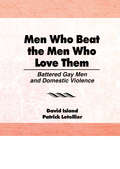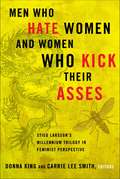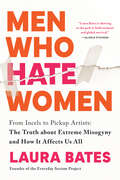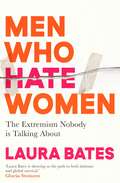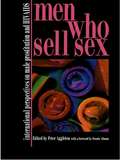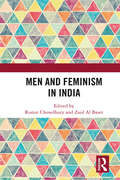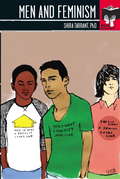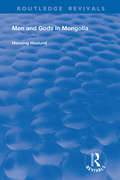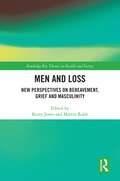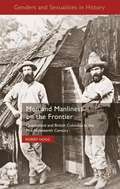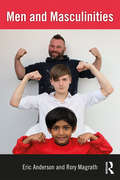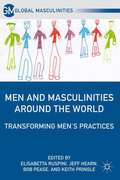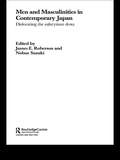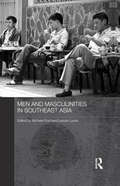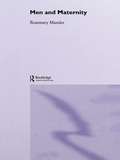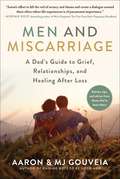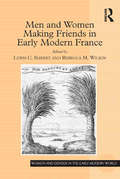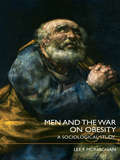- Table View
- List View
Men Explain Things to Me
by Rebecca SolnitThe National Book Critics Circle Award–winning author delivers a collection of essays that serve as the perfect &“antidote to mansplaining&” (The Stranger). In her comic, scathing essay &“Men Explain Things to Me,&” Rebecca Solnit took on what often goes wrong in conversations between men and women. She wrote about men who wrongly assume they know things and wrongly assume women don&’t, about why this arises, and how this aspect of the gender wars works, airing some of her own hilariously awful encounters. She ends on a serious note— because the ultimate problem is the silencing of women who have something to say, including those saying things like, &“He&’s trying to kill me!&” This book features that now-classic essay with six perfect complements, including an examination of the great feminist writer Virginia Woolf&’s embrace of mystery, of not knowing, of doubt and ambiguity, a highly original inquiry into marriage equality, and a terrifying survey of the scope of contemporary violence against women. &“In this series of personal but unsentimental essays, Solnit gives succinct shorthand to a familiar female experience that before had gone unarticulated, perhaps even unrecognized.&” —The New York Times &“Essential feminist reading.&” —The New Republic &“This slim book hums with power and wit.&” —Boston Globe &“Solnit tackles big themes of gender and power in these accessible essays. Honest and full of wit, this is an integral read that furthers the conversation on feminism and contemporary society.&” —San Francisco Chronicle &“Essential.&” —Marketplace &“Feminist, frequently funny, unflinchingly honest and often scathing in its conclusions.&” —Salon
Men Getting Married in England, 1918–60: Consent, Celebration, Consummation (Genders and Sexualities in History)
by Neil PenlingtonStarting after the Great War, this book charts the rise of the ritualistic engagement, the modern white wedding and the more widely available honeymoon holiday, to show changes and continuities in English masculinity by considering power relations between men and women. Through a close reading of a range of sources (including first-person testimonies, newspapers and etiquette manuals), power relations between bride and groom, and between different generations, are revealed in the context of social class and the rise of consumerism.
Men Out of Focus: The Soviet Masculinity Crisis in the Long Sixties
by Marko DumančićMen Out of Focus charts conversations and polemics about masculinity in Soviet cinema and popular media during the liberal period – often described as "The Thaw" – between the death of Stalin in 1953 and the invasion of Czechoslovakia in 1968. The book shows how the filmmakers of the long 1960s built stories around male protagonists who felt disoriented by a world that was becoming increasingly suburbanized, rebellious, consumerist, household-oriented, and scientifically complex. The dramatic tension of 1960s cinema revolved around the male protagonists’ inability to navigate the challenges of postwar life. Selling over three billion tickets annually, the Soviet film industry became a fault line of postwar cultural contestation. By examining both the discussions surrounding the period’s most controversial movies as well as the cultural context in which these debates happened, the book captures the official and popular reactions to the dizzying transformations of Soviet society after Stalin.
Men Trapped in Men's Bodies
by Anne A. LawrenceThere are few topics in sex research as compelling and confounding to researchers, clinicians, and the general public as that of transsexualism. Upending normative notions of gender, eroticism, and identity, it poses significant scientific and clinical challenges. The book addresses a fascinating and largely unexplored topic within the study of transsexualism: The feelings and desires of conventionally masculine men who are attracted to women yet want to become women themselves. Through a collection and discussion of vivid first-person narratives, the book provides an in-depth examination of these men's unusual propensity to be sexually aroused by the thought of themselves as women and how these men's sexual feelings influence their decisions to seek or undergo sex reassignment. These narratives about autogynephilia by autogynephilic male-to-female (MtF) transsexuals provide the first comprehensive documentation of the erotic ideation that underlies the most common form of MtF transsexualism. The narratives provide empirical evidence for Blanchard's theory of MtF transsexual motivation, and thus are of interest to researchers and theorists studying the phenomenology of MtF transsexualism. The narratives are likely to be eye-opening to psychologists, psychiatrists, physicians, and other professionals who work with MtF transsexuals: Most clinicians probably do not fully appreciate the erotic underpinnings of their clients' condition. A better understanding of their clients' autogynephilic feelings and motivations would enable these professionals to provide more empathetic and effective clinical care.
Men Under Fire: Motivation, Morale, and Masculinity among Czech Soldiers in the Great War, 1914–1918 (Austrian and Habsburg Studies #26)
by Jiří HutečkaIn historical writing on World War I, Czech-speaking soldiers serving in the Austro-Hungarian military are typically studied as Czechs, rarely as soldiers, and never as men. As a result, the question of these soldiers’ imperial loyalties has dominated the historical literature to the exclusion of any debate on their identities and experiences. Men under Fire provides a groundbreaking analysis of this oft-overlooked cohort, drawing on a wealth of soldiers’ private writings to explore experiences of exhaustion, sex, loyalty, authority, and combat itself. It combines methods from history, gender studies, and military science to reveal the extent to which the Great War challenged these men’s senses of masculinity, and to which the resulting dynamics influenced their attitudes and loyalties.
Men Who Beat the Men Who Love Them: Battered Gay Men and Domestic Violence
by Patrick Letellier David IslandDomestic violence in gay male relationships is the third largest health problem for gay men in America today. Men Who Beat the Men Who Love Them breaks the silence surrounding gay male domestic violence and exposes this hidden yet prevalent and destructive problem. The authors paint a vivid picture of gay men’s domestic violence, bringing its brutality to life by including personal narratives, written by one of the authors, by clearly defining what it is and what it is not through lists of violent acts and criminal code categories, and by thoroughly examining and analyzing the criminal, mental health, medical, political, and interpersonal issues involved. The authors boldly depart from the battered women’s literature by asserting that batterers have a diagnosable mental disorder, that battering is not gender based, and that much further criminalization of domestic violence is necessary.Striving for victim advocacy, the book underscores the idea that gay men’s domestic violence is totally unacceptable and is caused solely by individual abusive gay men who choose to batter. The book builds on and departs from what is known about domestic violence, with the authors challenging several fundamental premises in the literature, unabashedly identifying battering as a mental disorder. The authors explain that victims cannot stop their battering partners from battering and virtually all batterers choose to harm their partners in a premeditated fashion. The authors provide practical steps and suggestions for victims who want to leave and stay away from their violent partners and for friends who want to help battered gay men. Chapters describe the scope of the problem and refute myths and misconceptions. There are several detailed theory chapters in which the authors explain why gay men’s domestic violence occurs, who the batterers are, who the victims are at different stages of victimization, and how domestic violence can be stopped. A visionary, wide-ranging governmental and private plan of action is introduced, including lists of necessary laws and policies, as well as outlines of strong education, training, and advertising problems needed in various sectors of society. As a self-help book, Men Who Beat the Men Who Love Them provides practical information on a never-before discussed topic. As a trainer’s manual or teaching guide, it includes specific criteria for understanding the problem and for providing treatment.
Men Who Hate Women and Women Who Kick Their Asses: Stieg Larsson's Millennium Trilogy in Feminist Perspective
by Donna King Carrie Lee SmithStieg Larsson was an unabashed feminist in his personal and professional life and in the fictional world he created, but The Girl with the Dragon Tattoo, The Girl Who Played with Fire, and The Girl Who Kicked the Hornet's Nest are full of graphic depictions of violence against women, including stalking, sexual harassment, child abuse, rape, incest, serial murder, sexual slavery, and sex trafficking, committed by vile individual men and by corrupt, secretive institutions. How do readers and moviegoers react to these depictions, and what do they make of the women who fight back, the complex masculinities in the trilogy, and the ambiguous gender of the elusive Lisbeth Salander? These lively and accessible essays expand the conversation in the blogosphere about the novels and films by connecting the controversies about gender roles to social trends in the real world.
Men Who Hate Women and Women Who Kick Their Asses: Stieg Larsson's Millennium Trilogy in Feminist Perspective
by Donna King and Carrie Lee SmithStieg Larsson was an unabashed feminist in his personal and professional life and in the fictional world he created, but The Girl with the Dragon Tattoo, The Girl Who Played with Fire, and The Girl Who Kicked the Hornet's Nest are full of graphic depictions of violence against women, including stalking, sexual harassment, child abuse, rape, incest, serial murder, sexual slavery, and sex trafficking, committed by vile individual men and by corrupt, secretive institutions. How do readers and moviegoers react to these depictions, and what do they make of the women who fight back, the complex masculinities in the trilogy, and the ambiguous gender of the elusive Lisbeth Salander? These lively and accessible essays expand the conversation in the blogosphere about the novels and films by connecting the controversies about gender roles to social trends in the real world.
Men Who Hate Women: From Incels to Pickup Artists: The Truth about Extreme Misogyny and How it Affects Us All
by Laura BatesThe first comprehensive undercover look at the terrorist movement no one is talking about.Men Who Hate Women examines the rise of secretive extremist communities who despise women and traces the roots of misogyny across a complex spider web of groups. It includes eye-opening interviews with former members of these communities, the academics studying this movement, and the men fighting back.Women's rights activist Laura Bates wrote this book as someone who has been the target of many hate-fueled misogynistic attacks online. At first, the vitriol seemed to be the work of a small handful of individual men... but over time, the volume and consistency of the attacks hinted at something bigger and more ominous. As Bates went undercover into the corners of the internet, she found an unseen, organized movement of thousands of anonymous men wishing violence (and worse) upon women.In the book, Bates explores:Extreme communities like incels, pick-up artists, MGTOW, Men's Rights Activists and moreThe hateful, toxic rhetoric used by these groupsHow this movement connects to other extremist movements like white supremacyHow young boys are targeted and slowly drawn inWhere this ideology shows up in our everyday lives in mainstream media, our playgrounds, and our governmentBy turns fascinating and horrifying, Men Who Hate Women is a broad, unflinching account of the deep current of loathing toward women and anti-feminism that underpins our society and is a must-read for parents, educators, and anyone who believes in equality for women.Praise for Men Who Hate Women:"Laura Bates is showing us the path to both intimate and global survival."—Gloria Steinem"Well-researched and meticulously documented, Bates's book on the power and danger of masculinity should be required reading for us all."—Library Journal"Men Who Hate Women has the power to spark social change."—Sunday Times
Men Who Hate Women: From incels to pickup artists, the truth about extreme misogyny and how it affects us all
by Laura BatesA NEW YORK TIMES TOP 10 BESTSELLER &‘A fascinating, mind-blowing and deeply intelligent book that should be recommended reading for every person on our planet&’ SCARLETT CURTIS&‘Laura Bates puts out books that perfectly describe growing problems and possible solutions. She's a proper hero at the coal mouth&’ CAITLIN MORAN'Brilliantly fierce and eye-opening' OBSERVER ________________________________________________________The extremism nobody talks aboutAnd how it affects us all Imagine a world in which a vast network of incels and other misogynists are able to operate, virtually undetected. These extremists commit deliberate terrorist acts against women. Vulnerable teenage boys are groomed and radicalised. You don't have to imagine that world. You already live in it. Perhaps you didn&’t know, because we don&’t like to talk about it. But it&’s time we start. In this urgent and groundbreaking book, Laura Bates, bestselling author and founder of The Everyday Sexism Project, goes undercover to expose vast misogynist networks and communities. It&’s a deep dive into the worldwide extremism nobody talks about. Interviews with former members of these groups and the people fighting against them gives unique insights on how this movement operates. Ideas are spread from the darkest corners of the internet – via trolls, media and celebrities – to schools, workplaces and the corridors of power, becoming a part of our collective consciousness. Uncensored, and sometimes both shocking and terrifying – this is the uncomfortable truth about the world we live in. And what we must do to change it. _________________________________________________________&‘Passionate and forensic, Bates produces a powerful feminist clarion call. The world needs to take notice. Things must change&’ ANITA ANAND&‘This is how change is made: by looking at uncomfortable things directly in the eye and not turning away. This book is a rallying cry to end suffering, for both women AND men&’ EMMA GANNON&‘Laura Bates is showing us the path to both intimate and global survival&’ GLORIA STEINEM
Men Who Sell Sex: Global Perspectives (Sexuality, Culture and Health)
by Richard Parker Peter AggletonAll over the world, men as well as women exchange sex for money and other forms of reward, sometimes with other men and sometimes with women. In contrast to female prostitution, however, relatively little is known about male sex work, leaving questions unanswered about the individuals involved: their identities and self-understandings, the practices concerned, and the contexts in which they take place. This book updates the ground-breaking 1998 volume of the same name with an entirely new selection of chapters exploring health, social, political, economic and human rights issues in relation to men who sell sex. Looking at Europe, North America, Latin America and the Caribbean, Africa and the Asia-Pacific, each chapter explores questions such as: What is known about the different ways in which men exchange sex for money or other forms of reward? What are the major contexts in which sexual exchange takes place? What meanings do such practices carry for the different partners involved? What are the health and other implications of contemporary forms of male sex work? Men Who Sell Sex seeks to push the boundaries both of current personal and social understandings and the practices to which these give rise. It is an important reference work for academics and researchers interested in sex work and men’s health including those working in public health, sociology, social work, anthropology, human geography and development studies.
Men Who Sell Sex: International Perspectives on Male Prostitution and HIV/AIDS (Social Aspects of AIDS)
by Peter AggletonMen Who Sell Sex is the first comprehensive international account of male prostitution and AIDS. While much is known about female prostitution and sex work, relatively little is known about men who sell sex - either to women or other men. This book brings together an authoritative collection of essays from different countries and examines sexual behaviour, the reasons men sell sex, the meanings involved, and implications for HIV prevention. The authors are all experts in their fields and individual chapters offer a compelling description of the reasons men sell sex and the pleasures and risks involved.
Men and Feminism in India
by Romit Chowdhury Zaid Al BasetThe relationship between men and feminism is frequently assumed to be antagonistic. This volume confronts this assumption by bringing critical attention to men’s engagement in feminist research, pedagogy, and activism in India. The chapters in this collection respond to two broad thematic concerns: theoretical implications of men producing feminist knowledge and the history of men’s participation in feminist endeavours. The volume also explores the undocumented contributions of men to three domains of feminist activity: institutionalization of feminism in the academy, social movements aimed at gender justice, and male writings on gender and sexuality. Delving into an important yet overlooked aspect of the social sciences, this volume will be of great interest to scholars and researchers of gender studies, masculinity studies, modern Indian history, sociology, and social anthropology.
Men and Feminism: Seal Studies (Seal Studies)
by Shira TarrantThere's no denying that men's involvement and interest in feminism is key to its continuing relevance and importance. Addressing the question of why men should care about feminism in the first place, Men and Feminism lays the foundation for a larger discussion about feminism as a human issue, not simply a women's issue. Men are crucial to the movement - as fathers, brothers, husbands, boyfriends, and friends. From "why" to "how" to "what can men do", Men and Feminism answers all the questions men have about how and why they should get behind feminism.
Men and Gods in Mongolia: Sequel To Men And Gods In Mongolia (Routledge Revivals)
by Henning HaslundFirst published in 1935, Men & Gods in Mongolia is rare and unusual travel book that takes the reader into the virtually unknwon world of Mongolia, a country only now opening up to the West. Henning Haslund was a Swedish Explorer who accompanied Sven Hedin and other explorers into Mongolia and Central Asia in the 1920s and 30s. Haslund takes the reader to the lost city of Karakota in the Gobi desert, introduces the reader to the Bodgo Gegen, a God-king in Mongolia, and allows the reader to meet Dambin Jansang, the dreaded warlord of the 'Black Gobi'. Alongside the esoteric and mystical material, there is plenty of adventure; caravans across the Gobi desert; kidnapped and held for ransom; initation into shamanic societies; encounters with warlords; and the violent birth of a new nation.
Men and Loss: New Perspectives on Bereavement, Grief and Masculinity (Routledge Key Themes in Health and Society)
by Martin Robb Kerry JonesThis important book draws together new research and theories about bereavement, on the one hand, and men and masculinities on the other, to increase our understanding of men’s experience of loss and contribute towards improving support services for men following bereavement.Bereavement and loss are unavoidable events in life and can be challenging experiences for anyone, regardless of gender. However, in contemporary western cultures, men’s experience of bereavement continues to be framed by socially constructed ideas surrounding masculinity, which dictate that men must be stoic following a loss, with grief manifesting in either anger or despair. Men who do not grieve in accepted ‘masculine’ ways can feel judged, alienated or disenfranchised. This interdisciplinary and interprofessional collection presents theoretical analysis, reports of research findings, reviews of support and interventions, and a wealth of personal accounts. It includes chapters discussing partner loss, childhood bereavement, perinatal loss and bereavement through suicide, as well as bereavement at all stages of the life course.Men and Loss is an essential read for advanced students and researchers with an interest in men’s health and bereavement studies from a range of disciplinary backgrounds, including nursing, medicine, counselling, sociology, social work and psychology.
Men and Manliness on the Frontier
by Robert HoggIn mid-nineteenth-century Britain, there existed a dominant discourse on what it meant to be a man -denoted by the term 'manliness'. Based on the sociological work of R. W. Connell and others who argue that gender is performative, Robert Hogg asks how British men performed manliness on the colonial frontiers of Queensland and British Columbia.
Men and Masculinities
by Eric Anderson Rory MagrathEric Anderson is Professor of Sport, Masculinities, and Sexualities at the University of Winchester. He is an interdisciplinary scholar who studies men’s changing masculinities and sexualities. Professor Anderson is the architect of Inclusive Masculinity Theory and has published nineteen books and over seventy research articles. Rory Magrath is Senior Lecturer in the School of Sport, Health and Social Sciences at Southampton Solent University. His research focuses on decreasing homophobia and the changing nature of contemporary masculinities, with a specific focus on professional football. He is the author of Inclusive Masculinities in Contemporary Football: Men in the Beautiful Game (2016) and coauthor of Out in Sport: The Experiences of Openly Gay and Lesbian Athletes in Competitive Sport (2016).
Men and Masculinities Around the World
by Jeff Hearn Bob Pease Elisabetta Ruspini Keith PringleThis collection, with contributions from scholars in seventeen countries, analyses the characteristics and potential of diverse educational and political initiativestowards progressive changes in gender relations. "
Men and Masculinities in Contemporary Japan: Dislocating the Salaryman Doxa (Nissan Institute/Routledge Japanese Studies #10)
by James E. Roberson Nobue SuzukiThis book is the first comprehensive account of the changing role of men and the construction of masculinity in contemporary Japan. The book moves beyond the stereotype of the Japanese white-collar businessman to explore the diversity of identities and experiences that may be found among men in contemporary Japan, including those versions of masculinity which are marginalized and subversive. The book makes a significant contribution to our understanding of contemporary Japanese society and identity.
Men and Masculinities in Southeast Asia (Routledge Contemporary Southeast Asia Series)
by Michele Ford Lenore LyonsThis book brings together extensive recent innovative research on the study of men and masculinities in Southeast Asia. Drawing on rich ethnographic fieldwork from Vietnam, Cambodia, Thailand, the Philippines, Singapore, Indonesia and Timor-Leste, the book examines both dominant and marginal constructions of heterosexual masculinity and the ways in which these are performed in different localized contexts in insular and mainland Southeast Asia. Through the presentation of detailed ethnographic studies on topics ranging from the professional practices of Filipino merchant seafarers to the sex lives of Thai migrant workers to the stand-over tactics of Indonesian gangsters, the authors in this collection challenge the idea of emerging globalizing forms of masculinities. Where existing studies of gender in Asia tend to concentrate on women, East Asia and gay men, this book fills a significant gap and demonstrates, overall, how gender, ethnicity, class, sexuality and nationality shape contemporary understandings of what it means to be a ‘man’ in contemporary Southeast Asia.
Men and Maternity
by Rosemary ManderSince the development of modern medicine, men have become increasingly involved in childbearing as obstetricians and, more recently, as fathers. This book argues that the beneficial contribution of men has been taken for granted. Certain changes to childbearing practice have resulted, which, together with men's involvement, have been encouraged without any reference to evidence and without adequate opportunity for reflection.Considering the findings of recent research and wider literature, and using qualitative research with mothers the text examines:· how men became increasingly involved in childbearing · the medicalisation of childbirth · the difficulties men experience with childbirth as fathers · challenging situations, such as fathers' grief· the taken-for-granted assumptions that men’s increased contribution to childbearing is beneficialThis text will be of great interest to academics and postgraduate students of midwifery, obstetrics, medicine and health studies, as well as practising midwives and obstetricians, health visitors, childbirth educators and labor and delivery room nurses.
Men and Miscarriage: A Dad's Guide to Grief, Relationships, and Healing After Loss
by Aaron Gouveia MJ GouveiaFrom an esteemed author known for battling gender norms and bringing down "man up" culture, comes this essential guide for men and those who love them. Miscarriage, infertility, and abortion are generally considered women&’s issues—and while they are far from uncommon in our society, open conversations surrounding those topics are exceedingly rare. They're seen as taboo, even distasteful. And that&’s just for women. When it comes to men and how they are impacted by these issues, it&’s almost complete radio silence. It&’s not that men don&’t think about these things or aren&’t affected—after all, they make up half of most couples experiencing these issues—it&’s that toxic masculinity and gender stereotypes in our society tell men that suffering in silence equals strength and expressing emotions is weakness. It&’s men not knowing how to feel, how to express those feelings, or if they&’re even allowed to feel this trauma beyond supporting their partner. In Men and Miscarriage, husband and wife Aaron and MJ Gouveia ask men (and others) these questions directly. Using their own personal experiences enduring four miscarriages and a medically-necessary abortion combined with interviews of people from all different backgrounds and walks of life, the couple sheds light on how these topics influence men, women, their relationships, their mental health, and examines the shame and stigma too often associated with pregnancies that don't go as planned.
Men and Women Making Friends in Early Modern France (Women and Gender in the Early Modern World)
by Lewis C. Seifert Rebecca M. WilkinToday the friendships that grab people’s imaginations are those that reach across inequalities of class and race. The friendships that seem to have exerted an analogous level of fascination in early modern France were those that defied the assumption, inherited from Aristotle and patristic sources, that friendships between men and women were impossible. Together, the essays in Men and Women Making Friends in Early Modern France tell the story of the declining intelligibility of classical models of (male) friendship and of the rising prominence of women as potential friends. The revival of Plato’s friendship texts in the sixteenth century challenged Aristotle’s rigid ideal of perfect friendship between men. In the seventeenth century, a new imperative of heterosociality opened a space for the cultivation of cross-gender friendships, while the spiritual friendships of the Catholic Reformation modeled relationships that transcended the gendered dynamics of galanterie. Men and Women Making Friends in Early Modern France argues that the imaginative experimentation in friendships between men and women was a distinctive feature of early modern French culture. The ten essays in this volume address friend-making as a process that is creative of self and responsive to changing social and political circumstances. Contributors reveal how men and women fashioned gendered selves, and also circumvented gender norms through concrete friendship practices. By showing that the benefits and the risks of friendship are magnified when gender roles and relations are unsettled, the essays in this volume highlight the relevance of early modern friend-making to friendship in the contemporary world.
Men and the War on Obesity: A Sociological Study
by Lee F. MonaghanIs obesity really a public health problem and what does the construction of obesity as a health problem mean for men? According to official statistics, the majority of men in nations such as England and the USA are overweight or obese. Public health officials, researchers, governments and various agencies are alarmed and have issued dire warnings about a global ‘obesity epidemic’. This perceived threat to public health seemingly legitimates declarations of war against what one US Surgeon General called ‘the terror within’. Yet, little is known about weight-related issues among everyday men in this context of symbolic or communicated violence. Men and the War on Obesity is an original, timely and controversial study. Using observations from a mixed-sex slimming club, interviews with men whom medicine might label overweight or obese and other sources, this study urges a rethink of weight or fat as a public health issue and sometimes private trouble. Recognizing the sociological wisdom that things are not as they seem, it challenges obesity warmongering and the many battles it mandates or incites. This important book could therefore help to change current thinking and practices not only in relation to men but also women and children who are defined as overweight, obese or too fat. It will be of interest to students and researchers of gender and the body within sociology, gender studies and cultural studies as well as public health researchers, policymakers and practitioners.
